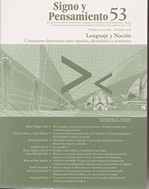Abstract
The UN commissioned UNESCO to devote 2008 to all world languages. Such endeavor, as far as the academic world is concerned (particularly all language schools and faculties), took a compulsory nuance of sorts. Yet, the diagnosis of the world’s situation vis-àvis our concern here, shows the precarious and serious condition this cultural wealth is now going through. Still, no matter how awesome, the preliminary outlines and drafts on some particularities offered by each of the Continents on the future of many languages do give us a wider perspective to better reflect on the problem. The almost weekly disappearance of one language around the world, and the concentration of 80% of the world’s population under only 4% of the spoken languages in order to communicate among them is certainly a fact for concern. Thus, the languages themselves, another of the world’s resources and wealth, threatened as they are in the midst of a dangerous world in crisis, will find in defending diversity their inexorable flagship.This journal is registered under a Creative Commons Attribution 4.0 International Public License. Thus, this work may be reproduced, distributed, and publicly shared in digital format, as long as the names of the authors and Pontificia Universidad Javeriana are acknowledged. Others are allowed to quote, adapt, transform, auto-archive, republish, and create based on this material, for any purpose (even commercial ones), provided the authorship is duly acknowledged, a link to the original work is provided, and it is specified if changes have been made. Pontificia Universidad Javeriana does not hold the rights of published works and the authors are solely responsible for the contents of their works; they keep the moral, intellectual, privacy, and publicity rights.
Approving the intervention of the work (review, copy-editing, translation, layout) and the following outreach, are granted through an use license and not through an assignment of rights. This means the journal and Pontificia Universidad Javeriana cannot be held responsible for any ethical malpractice by the authors. As a consequence of the protection granted by the use license, the journal is not required to publish recantations or modify information already published, unless the errata stems from the editorial management process. Publishing contents in this journal does not generate royalties for contributors.


